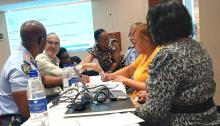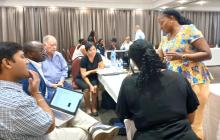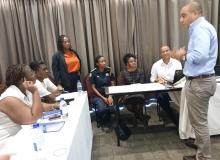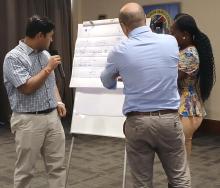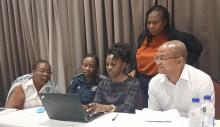Advancing Road Safety Through the Enhancement of Data Quality
Renowned for its excellent road infrastructure, Namibia has been a leader on the African continent in road safety, aligning its vision with the global decade of action on road safety. However, the high death toll on the Namibia roads is a stark reminder that good roads are not sufficient to ensuring road safety. A comprehensive strategy is essential, including ongoing enhancements in road and vehicle design, strengthening of laws and their enforcement, and ensuring timely emergency care for the injured.
The Deputy Minister of Works and Transport, Honorable Veikko Nekundi, in a speech read of his behalf, by Mr. Jonas Sheelongo, Deputy Executive Director in the Department of Transport, said that Namibia is signatory to the second Decade of Action on Road Safety and has ratified the African Road Safety Charter reaffirming its commitment to the halving road traffic deaths and serious injuries by 2030.
Honorable Nekundi was speaking at the workshop aimed at improving road safety data quality by reviewing Namibia's data systems for road traffic injuries and fatalities, conducting business process mapping of the data sources related to road traffic deaths, and developing a national action plan to improve the reporting of road traffic fatalities.
He noted that a comprehensive national data management system is vital to fully understand the economic, social, and health impacts of road crashes. "As a country, we lack sufficient monitoring and evaluation of key indicators. These are essential for assessing how various factors contribute to road traffic crashes," said Hon. Nekundi. He emphasized the need for stakeholders to prioritize improving data collection and to develop actionable plans for implementation to drive meaningful change.
During the event, Dr Ester Muinjangue, the Deputy Minister of Health and Social Services, highlighted the significance of collaboration among all national partners in developing the action plan. "This roadmap necessitates the cooperation of all stakeholders involved in road safety to establish new standards for data collection, enhance the reliability of our statistics, and ultimately save lives," she stated.
Dr. Richard Banda, WHO Representative to Namibia, praised the Namibian Government for its commitment to a comprehensive approach to road safety. 'The ambitious targets of zero deaths and injuries in the Namibian 2nd Decade of Action on Road Safety are essential if we are to turn the tide on road safety. We now have the opportunity to realize the targets and turn them into lives saved', Dr Banda noted. He urged businesses to prioritize safety and sustainability in their value chains and called on academia and civil society to generate evidence that would inform policy and action. He highlighted the urgent need to address critical behavioral and structural risk factors, including speeding, driving under the influence, and insufficient law enforcement.
Dr. Banda emphasized the importance of having a robust data management system to measure the progress of each country and ensure that they are on the right track. He stated that governments should implement mobility strategies that are based on accurate data, supported by strong legislation and funding, and that involve all sectors of society.
Key partners, including the Namibian Police, the National Statistics Agency, the Ministry of Health and Social Services, the Motor Vehicle Accident Fund, the Ministry of Works and Transport, the Ministry of Home Affairs and Immigration, as well as insurance companies, participated in a workshop aimed at enhancing collaboration and coordination on road safety data collection and reporting. The meeting focused on finalizing the mapping of data sources and connecting various institutions for a potential harmonized data system. The WHO committed to supporting the government at every stage of the process with its technical expertise.



